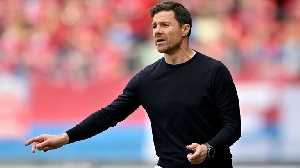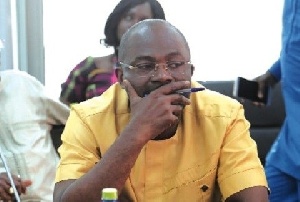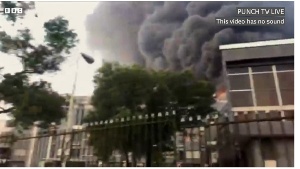- Boxing
- Athletics
- Basketball
- Bodybuilding
- Cricket
- Golf
- Handball
- Hockey
- Martial Arts
- Tennis
- Volleyball
- Other Sports

Sports News of Tuesday, 27 May 2025
Source: www.ghanawebbers.com
'A new era dawns at Real Madrid' - the challenges facing Xabi Alonso
Xabi Alonso has been announced as Real Madrid's new manager. This follows his decision to leave Bayer Leverkusen this summer. He has signed a three-year deal at the Bernabeu, succeeding Carlo Ancelotti.
Ancelotti's second spell at Madrid is coming to an end. He will take charge of Brazil, making way for Alonso's return. This transition marks the end of an era and the start of a new one.
Bayer Leverkusen respected their agreement with Alonso. They promised not to block his move if he received a better offer.
Alonso faces a significant challenge at Real Madrid. The club president, Florentino Perez, sees him as the long-term solution. At 43 years old, Alonso has gained recognition for his success at Leverkusen.
Last year, he led Leverkusen to an unbeaten Bundesliga title and a German Cup win in his first full season as a manager.
At Real Madrid, Alonso inherits a squad in transition. He must balance Kylian Mbappe's presence with Vinicius Jr.'s leadership. Vinicius is set to sign a longer contract soon.
Alonso also needs to integrate young players like Endrick and Arda Guler while phasing out older ones. Immediate trophy success is expected from him.
He will navigate boardroom expectations and media scrutiny from day one. While Alonso has tactical skills, talent alone may not ensure survival at Madrid.
After winning La Liga and the Champions League last season, Ancelotti’s departure was justified by this year's lack of trophies. His contribution cannot be underestimated; he won 15 trophies during two spells as manager.
Ancelotti brought dignity and calm during chaotic times at the club. He restored order when things were uncertain and won with style.
When Ancelotti returned in 2021 after Zidane’s resignation, the club was struggling. The stadium redevelopment was ongoing, and there was little direction for the team.
Despite losing key players like Sergio Ramos and Raphael Varane, Ancelotti led them to a La Liga and Champions League double in his first season back.
Financial pressures limited improvements to the squad due to rising stadium costs. However, through effective management and individual brilliance, they achieved success.
That success created future discord as player departures were not adequately addressed. When Mbappe arrived from PSG last summer, hopes were high for improvement.
However, fractures began appearing both tactically and within the locker room. Disagreements arose over physical preparation and discipline among players.
Perez became increasingly vocal about frustrations regarding defensive efforts from star players despite meetings aimed at resolving issues.
Concerns grew over how Guler was being managed and whether Endrick would thrive under Ancelotti’s approach. Tensions remained constant but never escalated into open conflict.
By October, club leadership felt that Ancelotti wasn’t addressing these issues effectively. The idea of moving in a new direction started gaining traction within the organization.
On-field coherence diminished as unity within the dressing room faded under Ancelotti’s management style. Key players stopped listening to him while others grew tired of his hands-off approach.
The rivalry between Vinicius Jr. and Mbappe added instability; both wanted prominence on the team but had conflicting preferences on positioning during games.
Although there was no overt conflict between them, their on-pitch dynamics revealed tension that staff noticed too easily.
Ancelotti struggled with managing egos in what he called one of his toughest changing rooms ever.
Pre-match media briefings became short-tempered as he felt unsupported by club leadership despite maintaining outward respectfulness towards fans’ loyalty expectations.
He requested right-back Kyle Walker in January due to injuries but faced rejection instead.
Outwardly respectful yet internally pressured by Perez’s expectations—Ancelotti now looks ahead toward coaching Brazil next.











